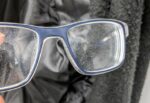We had a scare the other day when one of my boys took a bad fall while riding his bike. Off to the emergency room we went for a quick x-ray to make sure there were no broken bones, and luckily there weren’t.
While we were there, I got to talking with the radiologist about the pair of safety glasses he wore, and one thing led to another. He, and his colleagues, accepted my request to research the best radiation safety glasses the market currently has to offer.
We’ve become more aware of safety masks and safety glasses since the arrival of Covid, but in all honesty, I’ve never thought about the risks that some professionals take daily to give us better services and a better life.

So, we decided to dedicate one of our product research projects to find the proper safety eyewear for all those professionals that operate machines emitting radiation.
| Safety Glasses | Lens | Frame | Extras | Style | Lead Equivalency |
|---|---|---|---|---|---|
| Phillips Safety X-Ray Radiation | 2.2 mm thick heat-treated glass lens | Plastic | Neoprene foam inside, available in prescription and non-prescription versions | Vented Goggles with adjustable flame-resistant elastic headband | 0.75mm Pb; Meet EU 2016/425 Safety certification |
| Radiation .75 Pb Lead Lens | 1.80 High index glass lenses | Smoke gray nylon | Case, Cord, Removable side shields | Classic frame | 0.75 Pb |
| Schott SF-6 HT Radiation | 1.80 high index glass lenses are radiation-reducing distortion-free | plastic | Anti-scratch coating, Side shields, Perforated brow and nose guard, Rubber temple bar | Plastic frame glasses | 0.75 Pb; Side shields have 0.35 Pb |
| Schott SF-&HT Fit-Over Radiation | Schott SF-6 HT glass lenses | Plastic | Cord, Case, Microfiber cleaning pouch | Fit Over Prescription eyewear | 0.75 Pb |
The Reviews
Best Overall Radiation Safety Goggles
1.) Phillips Safety X-Ray Radiation Safety Goggles
- Attenuation: 95% radiation reduction at 125 KVP Direct Beam
- Lead Equivalent Lens: 0.75 mm (+/- .05) Pb glass
- vented goggle with neoprene foam on the inside to protect against splashing and sweat on your face
Prices pulled from the Amazon Product Advertising API on:
Product prices and availability are accurate as of the date/time indicated and are subject to change. Any price and availability information displayed on [relevant Amazon Site(s), as applicable] at the time of purchase will apply to the purchase of this product.
Manufacturer Phillips Safety offers RK2 radiation safety goggles that are vented. They feature neoprene foam inside the goggle design to protect from eventual splashing or perspiration discomfort.
One very convincing aspect of these safety glasses is that they are available in both non-prescription and prescription lens options. The prescription lens can be ordered for single vision necessities or as a bifocal.
Attenuation is a 95% reduction of radiation with a 125 kvp direct beam. The lead equivalent lens is 0.75mm Pb glass. Lenses are Schott SF-6 distortion-free, radiation reducing.
Produced in small, medium, and large options. The large lens allows for optimal viewing. Vented sides reduce fogging.
Pros
-
-
- 0.75mm Pb 2.2 mm thick heat-treated glass lens
- Scratch-resistant coating
- Available with a prescription lens, single vision, or bifocal
- Attenuation 95% reduction of radiation
- Vented goggle
- Neoprene foam inside
- Adjustable elastic band
-
Cons
-
-
- A bit heavy
-
Best Overall Radiation Safety Glasses
2.) Radiation .75 Pb Lead Lens Safety Glasses
- The Economy 70 frame comes in smoke gray nylon, equipped with removable side shields.
- The frame has a comfortable fit and has been a industry safety frame standard for many years.
- Comes with matching black side shields
Prices pulled from the Amazon Product Advertising API on:
Product prices and availability are accurate as of the date/time indicated and are subject to change. Any price and availability information displayed on [relevant Amazon Site(s), as applicable] at the time of purchase will apply to the purchase of this product.
For a classic style radiation safety glass, this model in a Titmus frame by brand Phillips Safety is certainly appealing. 1.80 High index lenses are standard High-Lite transmission glass for 20% more visible light and with 0.75 Pb Lead equivalency.
The Titmus frame is fashioned in smoke gray colored nylon and features protective matching black side shields that are removable. Offering a comfortable fit, the frame meets industry safety standards.
Pros
-
-
- Come with a case and cord
- Removable side shields
- Wider than a common pair of lead glasses
- Stylish
- 1.80 High index lenses
- High-Lite transmission glass
- Titmus nylon frame
- 0.75 Pb Lead equivalency
-
Cons
-
-
- No nose pads
- Heavy
-
Best Plastic Frame Radiation Safety Glasses
3.) Schott SF-6 HT Radiation Safety Glasses
- High-Lite transmissionwith 20% more visible light, 1.80 High Index Lenses
- Attenuation: 95% radiation reduction at 125 KVP Direct Beam
- Lead Equivalent Lens: 0.75 mm (+/- .05) Pb glass
- The model F10 utilizes a classic safety style that is solid, sturdy, and comfortable. The frame comes with perforated brow guard, perforated silicone nose guard and rubberized temple bar for a secure fit..
Prices pulled from the Amazon Product Advertising API on:
Product prices and availability are accurate as of the date/time indicated and are subject to change. Any price and availability information displayed on [relevant Amazon Site(s), as applicable] at the time of purchase will apply to the purchase of this product.
If you prefer the idea of a lightweight pair of radiation safety glasses, this Schott pair of safety glasses reproduces a classic style that is sturdy yet comfortable.
Adequate protection doesn’t equate to no style or less comfort. A perforated brow guard is integrated into the style together with a temple bar that is rubberized for a snug fit. The silicon nose guard is also perforated.
The 1.80 high index glass lenses are radiation-reducing distortion-free and feature a .75mm lead equivalency to protect eyes while side shields offer .35mm lead equivalency.
These safety glasses offer attenuation of 95% reduction of radiation with 125kvp high-lite direct-beam transmission.
Pros
-
-
- Attenuation 95% reduction of radiation
- Lead equivalent lens 0.75mm Pb glass
- High-lite transmission
- 1.80 high index lenses
- Distortion-free lenses with anti-scratch coating
- Plastic frame
- Brow and nose guard
- Temple bar in rubber
- One-year warranty
- Case, cord, and microfiber pouch included
-
Cons
-
-
- A little bit heavy
-
Best OTG Radiation Safety Fit-over Glasses
4.) Schott SF-&HT Radiation Safety Fit-Over Glasses
- The Fitover is a comfortable, lightweight frame that is designed to fit over prescription eyewear.
- This model will fit over almost any style of glasses with comfort.
- All lenses are standard with .75 Pb Lead Equivalency
- High-Lite Transmission Lenses with 20% More Visible Light, 1.80 High Index Lenses
Prices pulled from the Amazon Product Advertising API on:
Product prices and availability are accurate as of the date/time indicated and are subject to change. Any price and availability information displayed on [relevant Amazon Site(s), as applicable] at the time of purchase will apply to the purchase of this product.
Manufacturer VS Eyewear produces these “fit-over” radiation safety glasses for wear with your regular prescription eyewear.
They will fit over just about any style or prescription eyeglasses- High-lite transmission lenses offer 20% more visible light thanks to 1.80 lenses that are high index.
The lenses feature the standard 0.75 Pb lead equivalency for optimal protection from radiation. Black frames are in plastic with black side shields. The side shields have 0.35Pb Lead equivalency. Lenses are Schott SF-6 HT glass lenses.
Pros
-
-
- Schott SF-6 HT glass lenses
- Plastic frames
- Black side shields with 0.35 lead equivalency
- 0.75 Pb lead equivalency
- Cord, case, and microfiber cleaning pouch
-
Cons
-
-
- Heavy
- No nose protection
- Not for extra-large or oversized prescription glasses
-
Why Wear Radiation Safety Glasses?
Your eyes are delicate and susceptible to all kinds of daily hazards both in the workplace and at home. The eyes are particularly sensitive to the effects of radiation which can cause a permanent injury such as blindness or in any case, a severe life-changing disability.
Professionals that work regularly operating radiation-emitting equipment are at risk. Radiation emitting machines include:
-
-
- Electronic microscopes
- Fluoroscopes
- Irradiators
- Particle accelerators
- Radiographs
- X-ray machines
-
Because of advancements in medical technology, more powerful radiation tools are available for medical purposes. This means that pros, like my radiologist, need updated ad adequate protection from radiation hazards while on the job.
Even if we’re talking LDR or low-dose radiation, protection is necessary. Occasion exposure to radiation may not harm you, but if you are consistently exposed over time, your eyes can be damaged.
Healthcare workers that regularly work with x-rays or other radiation-emitting equipment will put themselves at risk for retinal damage, cataracts, pre-cataract lesions, dry eye, glaucoma, and eventual blindness without proper protection. And the more exposure you face, the more your risks increase.
Safety eyewear manufacturers regularly invest in research alongside ophthalmologists, and the radiation-emitting equipment industry to ensure that this equipment can be used safely.
Radiation safety glasses must now carry safety certification that is crucial to efficacy together with design, weight, fit, and comfort.
See also: Can I Use Anti-Radiation Glasses Everyday?
What If I Don’t Wear Radiation Safety Glasses?
You are unnecessarily placing yourself and your health at risk. If you do not have adequate eye protection, scatter radiation will impact the body.
This can damage the eye’s cells and can cause the lens in your eye to die. Disintegrating eye cells will build up on the eye lens and create cataracts.
How Do radiation Safety Glasses Function?
Radiation Safety glasses are lead-lined to block radiation: Lead boasts a high atomic mass so its heavy weight can easily block radiation waves.
When a material has a high atomic mass, it signifies that the atoms within are packed closely to one another so that they stop radiation energy from reaching the eyes.
What are the Most Important Characteristics for Good Radiation Glasses?
You initially may want to decide if you prefer to look for a pair of safety glasses or safety goggles. Style options can include wraparound safety glasses, metal frames, plastic frames, or OTG fit-over frames.
You can also opt for double protection if you work with lasers by choosing a pair that offers both radiation and laser protection.
Protection is what it is all about when it comes to radiation hazards. You’ll need a pair of safety glasses that offer a lead efficiency quota such as 0.75Pb Lead Efficiency. 0.75 mm will offer 100% radiation protection.
Lenses that are high-lite transmission, as well as SF6, can make a difference. Should you choose goggles, lenses that are 1.80 high index.
Whichever style you choose should have adjustable features to guarantee a good comfortable fit. If you are required to wear them throughout your entire workday, you need a comfortable fit, so you won’t be inclined to remove them placing your vision health at risk.
You don’t want such an important piece of PPE sliding around on your face all day.
Another consideration will be protecting the glasses once you have selected them. Can they be easily scratched or broken if you drop them? Do they come with a protective eyewear storage case?
Size is an equally crucial factor in your choice. Avoid the one-size-fits-all syndrome and choose a pair with a design that correctly fits your head and face. Weight should also factor in.
This type of protective safety eyewear can be heavier than other types of safety glasses, so look for the lightest possible weight to prevent pressure points on your face and on the bridge of your nose. If radiation safety glasses slide down your nose, you know they don’t fit.
Remember you don’t want to sacrifice protection for comfort or vice versa.
What If I Wear Prescription Glasses?
Not all radiation glass frames are designed to host prescription lenses. If you wish to select a pair that contain your everyday prescription lenses, make sure to select the correct type of frame.
Another alternative is to find a pair of radiation safety glasses that will comfortably fit over your daily prescription eyewear.
When selecting, ask if the frame style you prefer can be fitted with prescription lenses and if specific types of prescription lenses like bifocals, or varifocals can be inserted as well as single vision lenses for reading or distance vision.
Extra Features
Some safety radiation glasses may also offer other features apart from a solid protective case for storage. These may include anti-fog technology, anti-glare coatings, gaskets in foam, retention straps, or protective side shields that are removable.
Do I Need to Wear Safety Glasses that Protect Against Radiation?
Absolutely yes if you are also required to wear other lead protective equipment such as collars or aprons. If you regularly work with radiation-emitting machines such as x-rays, you need to mitigate the amount of scatter radiation you are exposed to.
Conclusion
Don’t expose your eyes to health risks, permanent damage, or eventual blindness when you can easily wear a pair of comfortable and classically styled radiation safety glasses. Enjoy lifelong healthy vision with the right kind of radiation safety glasses.











